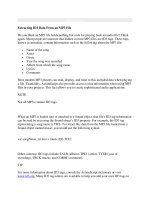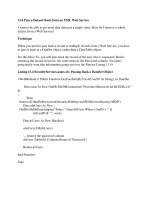DOL-ERISA Issues from an Investment Advisory Perspective
Bạn đang xem bản rút gọn của tài liệu. Xem và tải ngay bản đầy đủ của tài liệu tại đây (500.37 KB, 37 trang )
DOL/ERISA Issues
an
Investment Advisory Perspective
David C. Franceski, Jr., Esquire
Stradley Ronon Stevens & Young, LLP
William P. Simon, Jr.
Managing Director, Retirement Plan Services
Brinker Capital, Inc.
DOL’s
Changing Expectations
David C. Franceski, Jr., Esquire
Stradley Ronon Stevens & Young, LLP
Who is an ERISA Fiduciary?
ERISA § 3(21)
Definition of a Fiduciary: Any person who
exercises any discretionary authority or control respecting management of a
plan or disposition of plan assets
renders investment advice for a fee or other compensation, direct or
indirect, or has authority to do so
has any discretionary authority or responsibility in the administration of
such plan
ERISA § 3(38)
Definition of Investment Manager: Any fiduciary who
1.
has the power to manage, acquire or dispose of plan assets
2.
is registered as an investment advisor under federal or state law, a bank,
or an insurance company qualified to manage etc.; and
3.
has acknowledged in writing that he is a fiduciary with respect to the plan
DOL Gloss on Definition of Fiduciary
29 C.F.R. 2510.3-21(c)
Current Five Part Test – since 1975
1. renders advice as to purchase, sale or value
2. on a regular basis
3. pursuant to a mutual agreement, arrangement or understanding,
written or otherwise
4. which serves as a primary basis for investment decisions; and
5. which is individualized based on the needs of the plan
Investment Advisors Act, Section 202(a)(11):
Definition of Investment Advisor
specifically excludes “any broker or dealer whose performance of
such services is solely incidental to the conduct of his business as a
broker or dealer and receives no special compensation therefore.”
But see Nagy v. DeWese, 771 F.Supp.2d 502 (E.D. Pa. 2011);
2011 WL 2565200 (E.D. Pa.)
2011 Proposed Changes to DOL Regs
Other Considerations
Management Liability Under Federal and State
Securities Laws
Possible Claims
direct violation: controlling person liability under § 20(e) of the Securities
Exchange Act of 1934
aiding and abetting: § 203(e)(6) of Investment Advisors Act of 1940
companion state securities statutes
common law failure to supervise
Two Recent Examples
In the Matter of Theodore W. Urban – General Counsel Liability
though ultimately exonerated of failure to supervise changes, general
counsel found by ALJ in SEC civil proceeding to have supervisory
responsibility for sales personnel in case of abusive sales practices
In the Matter of Wunderlich Securities – CEO and CCO liability
CEO and CCO agreed to civil penalties totaling $95,000 in SEC action for
overcharging fees and failing to disclose principal transactions in feebased brokerage accounts
“Tone at the Top”
Key Fiduciary Concepts
All actions must be in the Client’s Best Interest
Be aware of actual or potential Conflicts of Interest;
which are waivable and which are not
The paramount importance of Disclosure
Absolute ban on Prohibited Transactions
Costs and compensation – both direct and indirect
The impact of Dodd-Frank Whistleblower provisions
The Impact of New Section 404(a)(5)
Competitive Impact of New Regulations
Downward pressure on plan fees and expenses
Cost-saving measures, with advantage to providers with
low cost solutions
New and different pricing options
Limitations on plan types and plan options
Revise or institute plan minimums
Increased use of “brokerage windows”
Legal Takeaways
Review and update firm policies and procedures
Review registrations – Series 6/7 v. IAR v. Solicitor
Review disclosure documents
fee disclosure
direct and indirect cost disclosure
principal transactions disclosure
Solicitor disclosure
Form B/D
Form ADV
Review institutional roles – CEO v. COO v. General Counsel
Training and continuing education
Know your co-fiduciaries: due diligence
So What is the
Big Deal About
Fiduciary Responsibility?
William P. Simon, Jr.
Managing Director, Retirement Plan Services
Brinker Capital, Inc.
It Depends on Who You Ask
Plan-sponsors ranked Fiduciary support 12th
in importance for reasons to select a
provider.
Wal-Mart, and Merrill Lynch agreed to
pay $13.5 Million to settle 401(k)
fiduciary lawsuit
Source: Cogent Research, Financial Advisor Magazine
Suitability
vs.
The Client’s Best Interest
Agenda
1. How today’s markets impact fiduciary risk
2. Fiduciary solutions: know the options
3. Building the right structure
The Last 3 to 4 Years
Managing Returns to…
Managing Risk
Summary of S&P 500
Rolling 10-Year Periods 1926-2010
Source: Zephyr StyleADVISOR, PPB Advisors, LLC
Fiduciary Solutions:
Know the Options
Many Firms, Many Voices
The Five Largest, Independent Broker Dealers
have 28,201 Financial Advisors
How do you manage their interaction with
multiple plan-sponsors, and reduce your
liability?
Source: Investment Advisor Magazine
FINRA – Dispute Resolution Cases
About 6,000 Cases per Year
Source: FINRA
Arbitration Cases Served by Controversy 2010
Source: FINRA
Breach of Fiduciary Duty
3,162
Omission of Facts
1,941
Unsuitability
1,974
Misrepresentation
1,795
Where Do You Fit In?
Investment Advisor?
Limited Scope?
Full Scope?
3(38)?
3(21)?
Solicitor?
Solicitor vs. Advisor
A Solicitor regularly refers clients to an Investment
Advisor and who receives compensation for those
referrals.
An Advisor provides advice or analysis on securities
either by making direct or indirect recommendations to
clients or by providing research or opinions on securities
or securities markets. An adviser with fiduciary
responsibilities is held to a higher ethical standard and
should have the knowledge to provide sophisticated
wealth management services and advice.
Where Do You Fit In?
3(21) Limited Scope
Has no discretion. Advice may, or may not be
acted upon
3(21) Full Scope
Is a Named Fiduciary, and has discretion to
hire, or change a manager
3(38) Investment Manager
By definition they have discretion, and act as
a fiduciary









